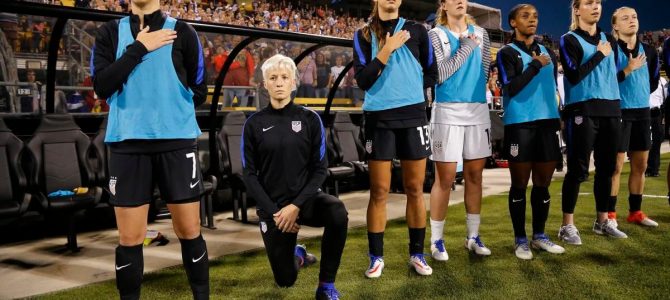
A new feature of NFL pre-game analysis is the discussion of what postures players will take during the national anthem. Will they follow the lead of San Francisco 49ers quarterback Colin Kaepernick and kneel? Will they link arms, like the Seattle Seahawks?
With the NBA pre-season beginning next week, journalists seem more interested in the possibility of anthem protests than in the odds of Cleveland repeating. The league’s two most popular players, LeBron James and Stephen Curry, have already announced their intention to stand during the anthem, while also expressing support for those who choose to protest.
But it’s not only famous players in the biggest leagues getting attention for these protests. Earlier this month, Megan Rapinoe, a midfielder for the Seattle Reign of the National Women’s Soccer League, knelt during the pre-game national anthem. She explained she did so to show support for Kaepernick, and because “we need a more substantive conversation around race relations and the way people of color are treated.”
People reacted to her kneeling more or less the same way they did to Kaepernick’s. Her team did not punish her (apart from still being called the Seattle Reign). Neither did the league. Her teammates supported her. The only unique response was when an opposing team short-circuited her protest by playing the anthem while the players were still in the locker rooms.
But Rapinoe, who is also a member of the U.S. women’s national soccer team, added a layer of complexity to her protests when she knelt before a national team match against Thailand, and again a few days later before a game against the Netherlands.
At this point it’s clear that race relations are a problem in America, as is how police treat too many black citizens. But whatever you think of these athletes’ protests or the appropriateness of their gestures, Rapinoe’s decision to kneel before the national team match is inconsistent with her decision to play on the team in the first place. If her unhappiness with the state of her country prevents her from standing during the anthem, it should also keep her off the field.
I’m Angry at This Country But I’ll Represent It
Before getting into the details of Rapinoe’s status on the national team, a quick look at her explanation for kneeling shows how shallow it is. For one thing, it’s obvious that Rapinoe doesn’t really want more conversation. If, after a year of dialogue, the consensus were that race relations are fine, you can bet Rapinoe would not be satisfied. She really means she wants more people to agree with her: she wants to persuade, and protesting the anthem is her means of persuasion.
She also explains herself by saying that she is “not saying we are not one of the greatest countries in world. Just need to accept that [it is] not perfect, things are broken.” But nobody believes America is perfect, and standing during the anthem does not imply otherwise.
When Republicans stand for the anthem, it’s not interpreted as a tacit approval of President Obama’s executive orders, or the Iran deal, or abortion laws. Conversely, when I see Democrats stand during the anthem, I don’t assume they’re suddenly satisfied with our gun control policies or immigration laws. The “attention means perfection” argument is a red herring.
But the strangest thing about Rapinoe’s protest is that she does it before she spends an entire soccer game representing the nation she’s protesting. As everyone rightly says, she and Kaepernick “have every right” to take a knee. Nonetheless, the implications differ when your team is not a local franchise of a private corporation, but the official team of the nation you’re protesting. At that point, the gesture is insincere at best and hypocritical at worst.
National Teams Represent the Nation, Just Like the Anthem
That’s because of the obvious fact that when you compete on a national team, you represent your nation. National team members set out to prove that their specific country, whatever its faults, excels at that particular competition. Even future Hall of Fame professional athletes are honored to compete in the Olympics for this reason. Ironically for Rapinoe, members of national teams share this representative quality with the flag and the anthem. The banner and song represent America in the sense that they embody elements of American identity and ideals; players do so in that they compete on behalf of the country.
By taking a knee during the anthem, Rapinoe is protesting what the other two symbols represent—a gesture that she proceeds to undermine the moment she takes the field. When she plays for the national team, she is as much a representative of the United States as the flag and anthem she declines to honor before the game.
As Jason Page succinctly puts it, “if you feel that strongly about standing for a national anthem dedicated to your country, then how can you run around for 90 minutes-plus donning those same stars and stripes?” The inconsistency has a mercenary air to it, as if Rapinoe wants to play on one of the world’s best teams without the attendant patriotism.
Call her protest brave if you like; it’s certainly not intellectually consistent. Consistency would mean sitting these games out. That sounds much more difficult than it is—so far she’s only knelt before international friendlies. Glorified scrimmages, they mean nothing for the team’s global standing. Also, the team probably would have survived without her: the United States defeated Thailand 9-0 and the Netherlands 3-1.
I don’t doubt Rapinoe’s sincerity, nor am I dismissing her cause. But if she believes her country does not deserve a basic sign of respect before games, she should refrain from representing it when her team returns to the field next month. That would be a consistent, difficult, and truly brave protest.









